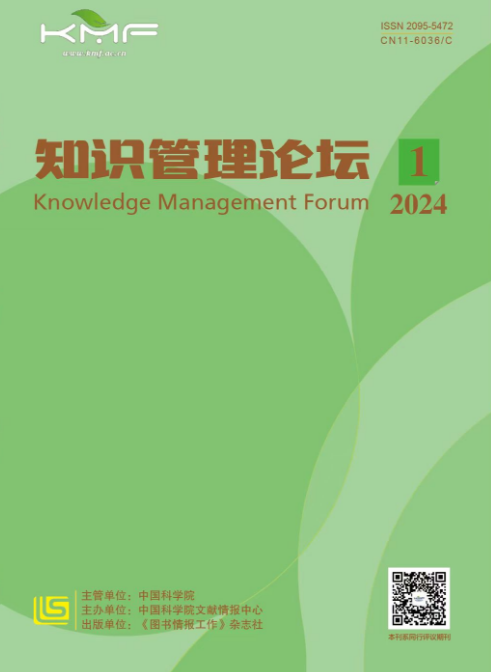 PDF(1253 KB)
PDF(1253 KB)


Social Science Research Management from the Perspective of Soft Knowledge Service and Evaluation
Xinquan Ge
Knowledge Management Forum ›› 2024, Vol. 9 ›› Issue (1) : 2-15.
 PDF(1253 KB)
PDF(1253 KB)
 PDF(1253 KB)
PDF(1253 KB)
Social Science Research Management from the Perspective of Soft Knowledge Service and Evaluation
[Purpose/Significance] National high-quality development, construction of China's modernized economic systemscientific, technological development and prosperous development of social sciences all require scientific social science research management. [Process/Methodology] Focusing on the problem of social science research management that favored science thinking and ignores liberal arts thinking in practice and its involutional manifestations, the principle of individual-organizational choice and the principle of rule-ethical choice were analyzed to fit the needs of social science research management. The social science research based on value rationality of liberal arts thinking was compared with the natural science research based on instrumental rationality of science thinking to explore the role of liberal arts thinking in the management of social science research. [Results/Conclusions] Taking soft knowledge as the core and handhold of management, changing the concepts from researchers, research process, research results and talent cultivation service and evaluation, returning to the liberal arts thinking and according to the characteristics of social sciences and their scientific research, this paper proposed the idea and method of social science research management based on soft knowledge service and evaluation. It will be beneficial to the creation of an excellent scientific research culture, the rising enthusiasm of researchers, and cultivating of talents who can generate scientific achievements and new thoughts. It not only serves the development of social economy and science and technology, but also serves the prosperity and development of social science.

value-based rationality / liberal arts thinking / soft knowledge / service and evaluation / social science / research management
| [1] |
葛新权.基于知识管理的广义营商环境建设与保障[J].知识管理论坛,2021,6(3):127-133.(GE X Q. A general business environment building and guarantee based on knowledge management[J].Knowledge management forum,2021,6(3):127-133.)
|
| [2] |
德鲁克.卓有成效的管理者[M].许是祥,译.北京:机械工业出版社,2009.(DRUCKER P. The effective executive[M]. XU S X, Trans. Beijing:China Machine Press, 2009.)
|
| [3] |
王利明.实事求是永无止境[N].光明日报,2014-12-22(6).(WANG L M. Seeking truth from reality never stops[N]. Guangming daily,2014-12-22(6).)
|
| [4] |
吉见俊哉.“废除文科学部”的冲击[M]. 王京,史歌,译. 上海:上海译文出版社,2022.(YOSHIMI T. The impact of the "Abolition of the ministry of liberal arts" [M]. WANG J, SHI G, trans. Shanghai: Shanghai Translation Publishing House, 2022.)
|
| [5] |
姜建强.日本学者如何回应“文科无用论”科无用论[EB/OL].[2023-09-29]. https://new.qq.com/rain/a/20220824A05V8G00.(JIANG J. How Japanese scholars respond to the "useless theory of liberal arts"[EB/OL].[2023-09-29].https://new.qq.com/rain/a/20220824A05V8G00.)
|
| [6] |
王锟.工具理性和价值理性——理解韦伯的社会学思想[J].甘肃社会科学,2005(1):120-122.(WANG K. Instrumental rationality and value rationality——understanding Weber's sociological thought[J]. Gansu social science,2005(1):120-122.)
|
| [7] |
丘成桐.数理与人文[EB/OL].[2023-09-29].https://mp.weixin.qq.com/s?__biz=MzIyNzUxMjE1Mw==&mid=2247495458&idx=2&sn=004b18d718eb84547ba5fe9e6f822050&chksm=e862b514df153c02a7d0de4da248cf76c29d9e5e8d022204fe49e56c9773847a40f1c9fc149a&scene=27.(QIU C T. Mathematics and humanities[EB/OL].[2023-09-29].https://mp.weixin.qq.com/s?__biz=MzIyNzUxMjE1Mw==&mid=2247495458&idx=2&sn=004b18d718eb84547ba5fe9e6f822050&chksm=e862b514df153c02a7d0de4da248cf76c29d9e5e8d022204fe49e56c9773847a40f1c9fc149a&scene=27.)
|
| [8] |
徐毅.物理学中的思想实验[J].吉林师范学院学报,1996(5):27-30.(XU Y. Thought experiments in physics[J]. Journal of Jilin Normal University,1996(5):27-30.)
|
| [9] |
冷英.加德纳的多重智力理论及其启示[J].心理学探新,2001(1):33-37.(LENG Y. Gardner's multiple intelligence theory and its implications[J]. Psychological exploration, 2001(1):33-37.)
|
| [10] |
葛新权.知识创新视角下社会科学研究及其成果评价的思考[J].知识管理论坛,2022,7(1):2-11.(GE X Q. Thinking about evaluation of social science research results[J].Knowledge management forum, 2022,7(1):2-11.)
|
/
| 〈 |
|
〉 |